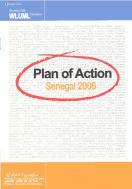Plan of Action - Senegal 2006
| Attachment | Size |
|---|---|
| PDF Document | 159.61 KB |

Over 50 women participated from 22 countries - Afghanistan, Bangladesh, Burkina Faso, Cameroon, Canada, Egypt, Gambia, Iran, Iraq, Israel-Palestine, Malaysia, Mali, Morocco, Nigeria, Pakistan, Senegal, South Africa, Sri Lanka, Sudan, Tanzania, UK, and USA. Many dozens more contributed to the PoA through regional and country-specific meetings that preceded the Senegal meeting. The resulting PoA incorporates the views of as many networkers as possible in the collective identification of the issues critical to women's struggles for equality and their human rights in Muslim countries and communities.
Over three days of intensive discussions, we shared examples from our diverse contexts of how networking through WLUML has strengthened our ability to address the various challenges we face. We also identified, against the background of changed global, regional and national contexts, the critical shared issues facing women’s struggles across the network that the network is best placed to address.
The critical issues identified at the Senegal Plan of Action meeting as our priorities for collective analysis and action are:
- Peace-Building and Resisting the Impact of Militarization
- Preserving Multiple Identities and Exposing Fundamentalisms
- Widening Debate about Women’s Bodily Autonomy
- Promoting and Protecting Women’s Equality Under Laws
WLUML’s analysis of the four critical issues explains why it is important to address each issue, and the comparative advantage of addressing these issues collectively as the network rather than engaging in purely localized initiatives.
At the PoA, we confirmed our collective strategies, and began identifying possible activities to be undertaken by the WLUML network in the foreseeable future. These are reflected in the Plan of Action document, which also summarises discussions about the structural transition required within WLUML to ensure that the network responds most appropriately and effectively to the analyses generated by our networkers.


